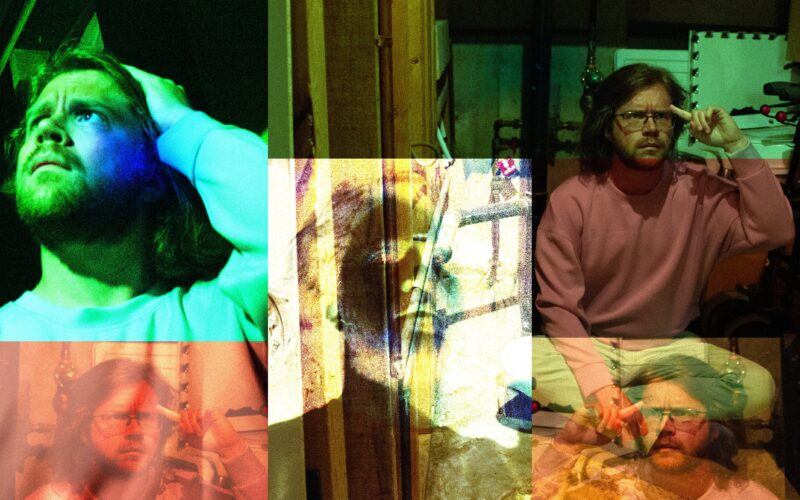Some albums whisper, others wail. Answer Me Smartass, the seventh full-length from Calgary’s Dominic Demierre under his solo art-pop moniker Celogen, doesn’t choose. It’s a liminal howl, equal parts lullaby and exorcism, tethered by the cracked but defiant voice of someone who’s barely holding on—and somehow building symphonies anyway.
Demierre—Celogen’s sole member, composer, producer, and multi-instrumentalist—emerges from a period of intense personal crisis. “To be frank,” he writes, “Answer Me Smartass comes out of trying to figure out why you’d carry on. Why you’d bother to choose life.” It’s a record forged in hospitals, real and metaphorical: his father’s near-fatal heart infection, a friend’s psychiatric admission, and his own time in crisis stabilization. Instead of yielding silence, he made music—a dense, mercurial, genre-elusive work that tackles trauma, hope, and human absurdity with unflinching precision.
On “Strange Ravenous Light”, Demierre channels the scorched ache of In Utero-era Nirvana. “You’ve seen the sinner, sobbing, bled dry / You’ve seen the saint caught in your headlights,” he sings, his voice trembling on the edge of collapse. The production is unrelenting—detuned guitars scrape against glitched-out percussion and ghostly harmonies. “I parasite through the telephone / I pump you full of kidney stones,” he growls, desperate and grotesque. It’s the sound of someone trying to claw their way out of the dark.
The second single, “Sauntering Towards Immunity”, slathers existential dread in glammy dissonance and sci-fi gospel. “For this is my machine of sweat / And this its hot influenza,” Demierre chants, collapsing the language of illness, theology, and technopop into a fever dream of mortality and desire. “It was me grappling with my dad’s brush with death,” he explains. “But also… trying to understand what makes life worth surviving. Why bother trusting anything?” It’s not a rhetorical question. It’s an SOS set to warped dancefloor beats and choral synths that glitch like sunspots.
But it’s “Meadowlark”—a shimmering, spectral ballad—that offers the album’s softest blow. Inspired by a friend’s psychiatric hospitalization and echoing the intimate grief of Sufjan Stevens’ Carrie & Lowell, the track is almost sacred in its gentleness.
“Astraeus, will you hear my fragile plea?” he asks, invoking Greek and Shinto deities to safeguard his friend’s soul. When Demierre sings “I tilt your heart toward the sun / Toward the song, the meadowlark of love,” the track becomes an invocation of something bigger than pain. “I played it for her,” he says, “and when I looked up, she and our friend were in tears. I remember thinking—good. It worked.”
That balance of heartbreak and humour—Answer Me Smartass, after all—is crucial to Demierre’s ethos. The album’s title nods to the way trauma and intimacy blur into absurdity. The liner notes feel like half-confession, half-performance art: “Hope in a crew-neck t-shirt, something I can cling to, afraid… I tried, I really did.” Through dense imagery and studio wizardry, he turns personal wounds into collective invitations: to grieve louder, to love harder, to not be afraid of looking ridiculous in the face of the void.
Demierre’s resume is fittingly eclectic. A former drummer in Calgary’s post-punk and emo circuits, he founded Celogen in 2018 as a way to “cut loose from readymade aesthetics.” His past releases have wandered through funk, industrial, baroque folk, and surreal showtunes, all stitched together by his love of jazz harmony, McCartney’s melodies, and the DIY production ethos of Prince and Trent Reznor. He calls each record “a diary of what went wrong and what went right that year.” Answer Me Smartass is the most emotionally raw yet compositionally sophisticated entry in that timeline.
Listen on Spotify here: https://open.spotify.com/album/7H27rc20hSEGYOr0LbCHRX?si=nX4jmLNOTmKfu5vnguI5cw&nd=1&dlsi=8b3e566a4c6d4943
The artwork, by Winona Julian, reflects that same tension: stark, smeared neon, like a shrine built on a napkin. Inside are liner notes that read like fevered poetry, teetering between revelation and delusion. The album is entirely self-produced, self-played, and self-mixed in his bedroom—a place where, as he puts it, “I try to touch the mystery. Because you endure it all just to get to care, ever, about anything.”

